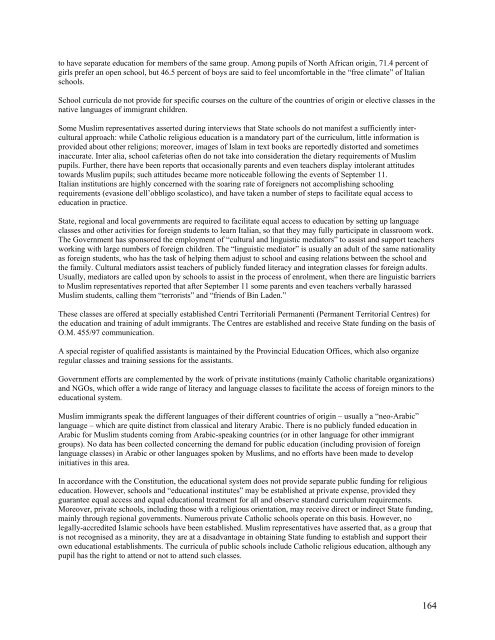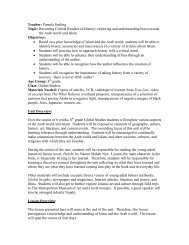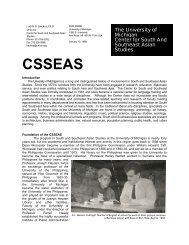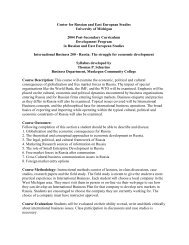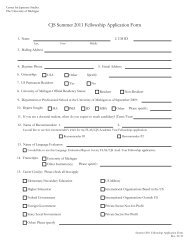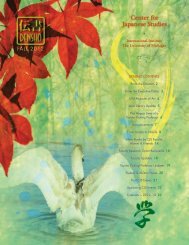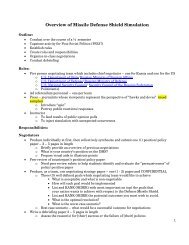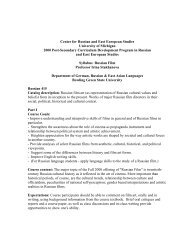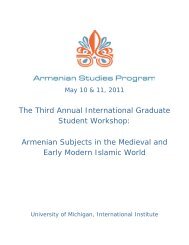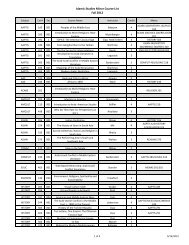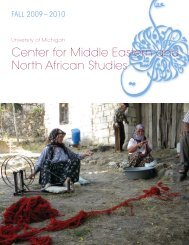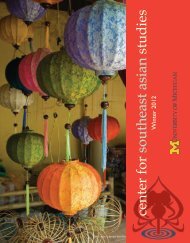Muslims in Europe: - International Institute - University of Michigan
Muslims in Europe: - International Institute - University of Michigan
Muslims in Europe: - International Institute - University of Michigan
You also want an ePaper? Increase the reach of your titles
YUMPU automatically turns print PDFs into web optimized ePapers that Google loves.
to have separate education for members <strong>of</strong> the same group. Among pupils <strong>of</strong> North African orig<strong>in</strong>, 71.4 percent <strong>of</strong><br />
girls prefer an open school, but 46.5 percent <strong>of</strong> boys are said to feel uncomfortable <strong>in</strong> the “free climate” <strong>of</strong> Italian<br />
schools.<br />
School curricula do not provide for specific courses on the culture <strong>of</strong> the countries <strong>of</strong> orig<strong>in</strong> or elective classes <strong>in</strong> the<br />
native languages <strong>of</strong> immigrant children.<br />
Some Muslim representatives asserted dur<strong>in</strong>g <strong>in</strong>terviews that State schools do not manifest a sufficiently <strong>in</strong>tercultural<br />
approach: while Catholic religious education is a mandatory part <strong>of</strong> the curriculum, little <strong>in</strong>formation is<br />
provided about other religions; moreover, images <strong>of</strong> Islam <strong>in</strong> text books are reportedly distorted and sometimes<br />
<strong>in</strong>accurate. Inter alia, school cafeterias <strong>of</strong>ten do not take <strong>in</strong>to consideration the dietary requirements <strong>of</strong> Muslim<br />
pupils. Further, there have been reports that occasionally parents and even teachers display <strong>in</strong>tolerant attitudes<br />
towards Muslim pupils; such attitudes became more noticeable follow<strong>in</strong>g the events <strong>of</strong> September 11.<br />
Italian <strong>in</strong>stitutions are highly concerned with the soar<strong>in</strong>g rate <strong>of</strong> foreigners not accomplish<strong>in</strong>g school<strong>in</strong>g<br />
requirements (evasione dell’obbligo scolastico), and have taken a number <strong>of</strong> steps to facilitate equal access to<br />
education <strong>in</strong> practice.<br />
State, regional and local governments are required to facilitate equal access to education by sett<strong>in</strong>g up language<br />
classes and other activities for foreign students to learn Italian, so that they may fully participate <strong>in</strong> classroom work.<br />
The Government has sponsored the employment <strong>of</strong> “cultural and l<strong>in</strong>guistic mediators” to assist and support teachers<br />
work<strong>in</strong>g with large numbers <strong>of</strong> foreign children. The “l<strong>in</strong>guistic mediator” is usually an adult <strong>of</strong> the same nationality<br />
as foreign students, who has the task <strong>of</strong> help<strong>in</strong>g them adjust to school and eas<strong>in</strong>g relations between the school and<br />
the family. Cultural mediators assist teachers <strong>of</strong> publicly funded literacy and <strong>in</strong>tegration classes for foreign adults.<br />
Usually, mediators are called upon by schools to assist <strong>in</strong> the process <strong>of</strong> enrolment, when there are l<strong>in</strong>guistic barriers<br />
to Muslim representatives reported that after September 11 some parents and even teachers verbally harassed<br />
Muslim students, call<strong>in</strong>g them “terrorists” and “friends <strong>of</strong> B<strong>in</strong> Laden.”<br />
These classes are <strong>of</strong>fered at specially established Centri Territoriali Permanenti (Permanent Territorial Centres) for<br />
the education and tra<strong>in</strong><strong>in</strong>g <strong>of</strong> adult immigrants. The Centres are established and receive State fund<strong>in</strong>g on the basis <strong>of</strong><br />
O.M. 455/97 communication.<br />
A special register <strong>of</strong> qualified assistants is ma<strong>in</strong>ta<strong>in</strong>ed by the Prov<strong>in</strong>cial Education Offices, which also organize<br />
regular classes and tra<strong>in</strong><strong>in</strong>g sessions for the assistants.<br />
Government efforts are complemented by the work <strong>of</strong> private <strong>in</strong>stitutions (ma<strong>in</strong>ly Catholic charitable organizations)<br />
and NGOs, which <strong>of</strong>fer a wide range <strong>of</strong> literacy and language classes to facilitate the access <strong>of</strong> foreign m<strong>in</strong>ors to the<br />
educational system.<br />
Muslim immigrants speak the different languages <strong>of</strong> their different countries <strong>of</strong> orig<strong>in</strong> – usually a “neo-Arabic”<br />
language – which are quite dist<strong>in</strong>ct from classical and literary Arabic. There is no publicly funded education <strong>in</strong><br />
Arabic for Muslim students com<strong>in</strong>g from Arabic-speak<strong>in</strong>g countries (or <strong>in</strong> other language for other immigrant<br />
groups). No data has been collected concern<strong>in</strong>g the demand for public education (<strong>in</strong>clud<strong>in</strong>g provision <strong>of</strong> foreign<br />
language classes) <strong>in</strong> Arabic or other languages spoken by <strong>Muslims</strong>, and no efforts have been made to develop<br />
<strong>in</strong>itiatives <strong>in</strong> this area.<br />
In accordance with the Constitution, the educational system does not provide separate public fund<strong>in</strong>g for religious<br />
education. However, schools and “educational <strong>in</strong>stitutes” may be established at private expense, provided they<br />
guarantee equal access and equal educational treatment for all and observe standard curriculum requirements.<br />
Moreover, private schools, <strong>in</strong>clud<strong>in</strong>g those with a religious orientation, may receive direct or <strong>in</strong>direct State fund<strong>in</strong>g,<br />
ma<strong>in</strong>ly through regional governments. Numerous private Catholic schools operate on this basis. However, no<br />
legally-accredited Islamic schools have been established. Muslim representatives have asserted that, as a group that<br />
is not recognised as a m<strong>in</strong>ority, they are at a disadvantage <strong>in</strong> obta<strong>in</strong><strong>in</strong>g State fund<strong>in</strong>g to establish and support their<br />
own educational establishments. The curricula <strong>of</strong> public schools <strong>in</strong>clude Catholic religious education, although any<br />
pupil has the right to attend or not to attend such classes.<br />
164


